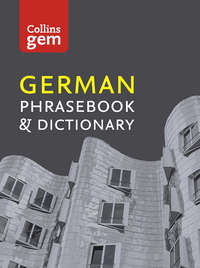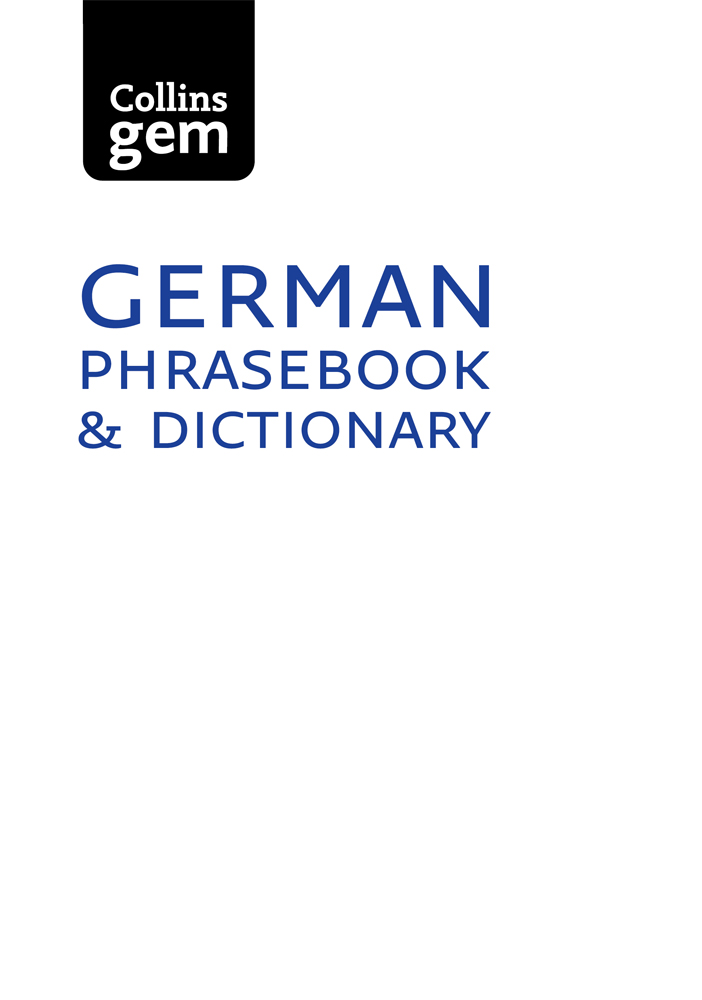
Collins Gem


Copyright
HarperCollins Publishers
Westerhill Road
Bishopbriggs
Glasgow G64 2QT
Fourth Edition 2016
© HarperCollins Publishers 1993, 2007, 2010, 2016
Source ISBN: 9780008135966
Ebook Edition © March 2016 ISBN: 9780008163525
Version: 2016-03-01
Collins® and Collins Gem® are registered trademarks of HarperCollins Publishers Limited
www.collinsdictionary.com
All rights reserved under International and Pan-American Copyright Conventions. By payment of the required fees, you have been granted the nonexclusive, nontransferable right to access and read the text of this e-book on-screen. No part of this text may be reproduced, transmitted, downloaded, decompiled, reverse-engineered, or stored in or introduced into any information storage and retrieval system, in any form or by any means, whether electronic or mechanical, now known or hereafter invented, without the express written permission of HarperCollins e-books.
Entered words that we have reason to believe constitute trademarks have been designated as such. However, neither the presence nor absence of such designation should be regarded as affecting the legal status of any trademark.
The contents of this publication are believed correct at the time of creation. Nevertheless the Publisher can accept no responsibility for errors or omissions, changes in the detail given or for any expense or loss thereby caused.
HarperCollins does not warrant that any website mentioned in this title will be provided uninterrupted, that any website will be error free, that defects will be corrected, or that the website or the server that makes it available are free of viruses or bugs. For full terms and conditions please refer to the site terms provided on the website.
Acknowledgements
We would like to thank those authors and publishers who kindly gave permission for copyright material to be used in the Collins Corpus. We would also like to thank Times Newspapers Ltd for providing valuable data.
If you would like to comment on any aspect of this book, please contact us at the given address or online.
E-mail: dictionaries@harpercollins.co.uk


Editor
Holly Tarbet
Contributors
Helen Galloway
Janice McNeillie
Jany Schneider
For the Publisher
Gerry Breslin
Helen Newstead
Sarah Woods
Using your phrasebook
Whether you’re on holiday or on business, your Collins Gem Phrasebook and Dictionary is designed to help you locate the exact phrase you need, when you need it. You’ll also gain the confidence to go beyond what is in the book, as you can adapt the phrases by using the dictionary section to substitute your own words.
The Gem Phrasebook and Dictionary includes:
• Over 60 topics arranged thematically, so that you can easily find an expression to suit the situation
• Simple pronunciation which accompanies each word and phrase, to make sure you are understood when speaking aloud
• Tips to safeguard against any cultural faux pas, providing the essential dos and don’ts of local customs or etiquette
• A basic grammar section which will help you to build on your phrases
• FACE TO FACE dialogue sections to give you a flavour of what to expect from a real conversation
• A handy map of the country which shows the major cities and how to pronounce them
• YOU MAY HEAR sections for common announcements and messages, so that you don’t miss important information when out and about
• A user-friendly 3000 word dictionary to ensure you’ll never be stuck for something to say
• A short chapter of LIFELINE phrases for quick reference. These basic words and phrases will be essential to your time abroad
Before you jet off, it’s worth spending time looking through the topics to see what is covered and becoming familiar with pronunciation.
Contents
Copyright
Acknowledgements
Using your phrasebook
Pronouncing German
Top ten tips
Talking to people
Hello/goodbye, yes/no
Key phrases
Signs and notices
Polite expressions
Celebrations
Making friends
Weather
Getting around
Asking the way
Bus and coach
Metro
Train
Taxi
Boat and ferry
Air travel
Customs control
Car hire
Driving
Petrol
Breakdown
Car parts
Road signs
Staying somewhere
Hotel (booking)
Hotel desk
Camping
Self-catering
Shopping
Shopping phrases
Shops
Food (general)
Food (fruit and veg)
Clothes
Clothes (articles)
Maps and guides
Post office
Technology
Leisure
Sightseeing and tourist office
Music
Out and about
Nightlife
Sport
Walking
Communications
Telephone and mobile
Text messaging
Internet
Practicalities
Money
Paying
Luggage
Complaints
Problems
Emergencies
Health
Pharmacy
Doctor
Dentist
Eating out
Eating places
In a bar/café
Reading the menu
In a restaurant
Dietary requirements
Wines and spirits
Menu reader
Reference
Alphabet
Measurements and quantities
Numbers
Days and months
Time
Time phrases
Public holidays
Phonetic maps
Grammar
Dictionary
English – GermanA – CD – FG – IJ – LM – OP – RS – UV – ZGerman – EnglishA – CD – FG – IJ – LM – OP – RS – UV – ZLIFELINE words and phrases
About the Publisher
Pronouncing German
In this book you are given the pronunciation of the phrases so that you will soon be able to recognize the different sounds. (The stressed syllable is marked in bold.) Here are a few rules you should know:
Germansounds likeexamplepronunciationacup/fatherdas/Abenddas/ahbentebed/hairBett/Meerbet/mehronot/roadoft/rotoft/rohtuput/bootNummer/gutnoommer/gootai/aypieMai/Mayermy/my-eraunowAutoowtohei/eypieeine/Meyeryn-e/my-ereutoyneunnoyniekeepsiezeechlochwachvakhjyesjagenyahgenqudark violetQuittungkvittoongsdress dizzy shipes sie sprechenes zee shprekh-enßjuiceFußfoosthteaTheaterteh-ahtervfanvonfonwvanwirveerzpetsZimmertsimmerUmlauts
Germansounds likeexamplepronunciationäbed/hairhätte/späthet-e/shpehtäuboyläutetloytetöArthur/furkönnen/Höhekur’nen/hur’-e*üduke/duedürfen/Müheduerfen/mue-e* ur’ as in hurt without the r pronounced
A final e is always pronounced, but weakly like the e in the: Seide (zy-de), bitte (bit-e).
An underline indicates a short vowel, e.g. Mutter (mootter), Mörder (murder), Küste (kueste).
If an h is added after the vowel, the sound is longer, e.g. Tag (tahk), Mädchen (meht-khen), Leben (lehben), hoch (hohkh).
Top ten tips
1 Germans may close doors more often than you are used to, but a closed door does not necessarily mean that the person cannot be disturbed. They are probably happy to receive you if you knock before entering.
2 If someone holds an academic title it’s always polite to use it.
3 When introduced to an adult, address them by their title and surname until they suggest using first names.
4 If the person you are talking to sneezes, say ‘Gesundheit’ (bless you!).
5 Shake hands when you get introduced to an adult.
6 In restaurants in general, wait until everyone is served before you dig in, and say ‘Guten Appetit!’ before you start. The latter is not entirely necessary, but considered good form.
7 Always use the polite ‘Sie’ form, except with friends and colleagues of your own age.
8 When asked ‘Wie geht es Ihnen?’ you should respond by first thanking them, saying ‘Danke, gut’.
9 Answer the phone by using your surname: ‘Bader, hallo’; if you’re at work, then follow this with the name of your company.
10 Sundays are sacred. It’s the ‘Ruhetag’ so you should be aware that noise is kept to a minimum.
Talking to people
Hello/goodbye, yes/no
When Germans meet they generally shake hands. The words for Mr and Mrs are Herr and Frau. Note that Fräulein (Miss) is no longer used, as it sounds rather patronizing.
Please/Don’t mention itBittebit-eThanks (very much)Danke schön dang-ke shur’nYesJa yahNoNein nynOK!Ok! okay!Sir/MrHerr herMadam/Mrs/MsFrau frowMiss (rarely used nowadays)Fräulein froylynHelloGuten Tag gooten tahkHiHallo hahloh, hallohGoodbyeAuf Wiedersehen owf veeder-zehnByeTschüss tshuesSee you laterBis später bis shpehterSee you tomorrowBis morgen bis morgenGood morningGuten Morgen gooten morgenGood eveningGuten Abend gooten ahbentGoodnightGute Nacht goote nakhtExcuse me!/Sorry!Entschuldigung! entshooldi-goong!Pardon?Wie bitte? vee bit-e?How are you?Wie geht es Ihnen? vee geht es eenen?Fine, thanksDanke, gut dang-ke, gootAnd you?Und Ihnen? oont eenen?I don’t speak GermanIch spreche kein Deutsch ikh shpre-khe kyn doytshDo you speak English?Sprechen Sie Englisch? shprekh-en zee eng-lish?Key phrases
You don’t need to say complicated things to get what you want. Often simply naming the thing and adding bitte will do the trick.
the (masculine)der/den dehr/dehn(feminine)die dee(neuter)das das(plural)die deethe stationder Bahnhof dehr bahn-hohfthe shopsdie Geschäfte dee geshef-tea/one (masculine)ein/einen yn/yn-en(feminine)eine yn-e(neuter)ein yna ticketeine Fahrkarte yn-e fahrkar-teone stampeine Briefmarke yn-e breefmar-kea roomein Zimmer yn tsimmerone bottleeine Flasche yn-e flash-esome (uncountable)etwas… etvas…(countable)ein paar… yn pahr…some sugaretwas Zucker etvas tsookersome jametwas Marmelade etvas mar-me-lah-desome cherriesein paar Kirschen yn pahr kirshenDo you have a room?Haben Sie ein Zimmer frei? hahben zee yn tsimmer fry?Do you have some milk?Haben Sie etwas Milch? hahben zee etvas milkh?I’d like…Ich möchte… ikh mur’kh-te…We’d like…Wir möchten… veer mur’khten…Some more…Etwas mehr… etvas mehr…Another…Noch ein/eine… nokh yn/yn-e…Some more breadEtwas mehr Brot etvas mehr brohtSome more glassesNoch ein paar Gläser nokh yn pahr glehzerAnother coffeeNoch einen Kaffee nokh yn-en kafehAnother beerNoch ein Bier nokh yn beerHow much is it?Was kostet das? vas kostet das?How much is the room?Was kostet das Zimmer? vas kostet das tsimmer?large/smallgroß/klein grohs/klynwith/withoutmit/ohne mit/oh-neWhere is/are…?Wo ist/sind…? vo ist/zint…?the nearest…der/die/das nächste… dehr/dee/das neh-kste…How do I get…?Wie komme ich…? vee kom-e ikh…?to the stationzum Bahnhof tsoom bahn-hohfto the barzur Bar tsoor barto Berlinnach Berlin nahkh berleenThere is/are…Es gibt… es gipt…There isn’t/aren’t any…Es gibt keine… es gipt kyn-e…When…?Wann…? van…?At what time…?Um wie viel Uhr…? oom vee feel oo-er…?todayheute hoy-tetomorrowmorgen morgenCan I…?Kann ich…? kan ikh…?smoke herehier rauchen heer row-khentaste ites probieren es pro-beer-renSigns and notices
EingangentranceAusgangexitgeöffnetopengeschlossenclosedheißhotkaltcoldTrinkwasserdrinking waterziehenpulldrückenpushrechtsrightlinksleftbitte…please…zum Mitnehmentake-awayfreifree, vacantbesetztengagedSelbstbedienungself-serviceHerrengentsDamenladiesaußer Betriebout of orderKassecash deskBaden verbotenno bathingzu vermietenfor hire/to rentzu verkaufenfor saleAusverkaufsaleUntergeschossbasementErdgeschossground floorAufzugliftklingelnringdrückenpressprivatprivateZimmer freirooms availablebelegtno vacanciesNotausgangemergency exitFahrkartenticketszu den Zügento the trainsbitte wählen Sieplease selectzahlbar mitpay withReisezentrumtravel centreFahrkarte entwertenvalidate your ticketGepäckaufbewahrungleft luggageFahrplantimetableAbfahrt (AB)departureAnkunft (AN)arrivalGleisplatformRauchersmokingRauchen verbotenno smokingPolite expressions
There are two forms of address in German, formal (Sie) and informal (du). You should always stick to the formal until you are invited to duzen (to use the informal du).
The meal was deliciousDas Essen war köstlich das essen var kur’stlikhThank you very muchVielen Dank feelen dankYou are very kindDas ist sehr nett von Ihnen das ist zehr net fon eenenDelighted to meet youFreut mich, Sie kennenzulernen froyt mikh, zee kennen-tsoo-lernenCelebrations
I’d like to wish you…Ich wünsche Ihnen/dir… ikh vuen-she eenen/deer…Merry Christmas!Frohe Weihnachten! froh-e vy-nakhten!Happy New Year!Ein frohes neues Jahr! yn froh-es noy-es yahr!All the best!Alles Gute! al-es goo-te!Happy birthday!Herzlichen Glückwunsch zum Geburtstag!herts-likhen gluek-voonsh tsoom ge-boorts-tahk!Have a good trip!Gute Reise! goo-te ry-ze!Cheers!Prost! or Prosit! prohst/prohzit!To your health!Zum Wohl! tsoom vohl!Making friends
We have used the informal du form for these conversations.
FACE TO FACE
Wie heißt du?
vee hyst doo?
What’s your name?
Ich heiße…
ikh hy-se…
My name is…
Woher kommst du?
voh-her komst doo?
Where are you from?
Ich komme aus Großbritannien
ikh kom-e ows grohs-bri-ta-ni-en
I’m British (I come from Britain)
Sehr erfreut!
zehr erfroyt!
Pleased to meet you!
How old are you?Wie alt bist du? vee alt bist doo?I’m … years oldIch bin … Jahre alt ikh bin … yah-re altWhere do you live?Wo wohnst du? voh vohnst doo?Where do you live? (plural)Wo wohnt ihr? voh vohnt eer?I live in LondonIch wohne in London ikh voh-ne in londonWe live in GlasgowWir wohnen in Glasgow veer vohnen in glahsgohEngland/EnglishEngland/englisch englant/englishScotland/ScottishSchottland/schottisch shotlant/shotishWales/WelshWales/walisisch wehlz/valeezishIreland/IrishIrland/irisch irlant/eerishUSA/Americandie USA/amerikanisch dee oo-es-ah/amehrikahnishAustralia/AustralianAustralien/australisch owstrah-li-en/owstrahlishI’m still studyingIch studiere noch ikh shtoo-deer-re nokhI workIch arbeite ikh arby-teI’m retiredIch bin pensioniert ikh bin penzio-neertI’m…Ich bin… ikh bin…(not) married(nicht) verheiratet (nikht) fer-hy-rahtetdivorcedgeschieden ge-sheedena widow(er)Witwe(r) vit-ve(r)I have…/no childrenIch habe…/keine Kinder ikh hah-be…/kyn-e kinderI’m here on holidayIch bin hier auf Urlaub ikh bin heer owf oorlowpI’m here on businessIch bin geschäftlich hier ikh bin gesheftlikh heerWhat work do you do?Was machen Sie beruflich? vas makhen zee be-rooflikh?Do you enjoy it?Macht es Ihnen Spaß? makht es eenen shpahs?I’m…Ich bin… ikh bin…a teacherLehrer(in) lehrer(in)a managerManager(in) men-ed-zher(in)I’m self-employedIch bin selbstständig ikh bin zelbst-shten-dikh